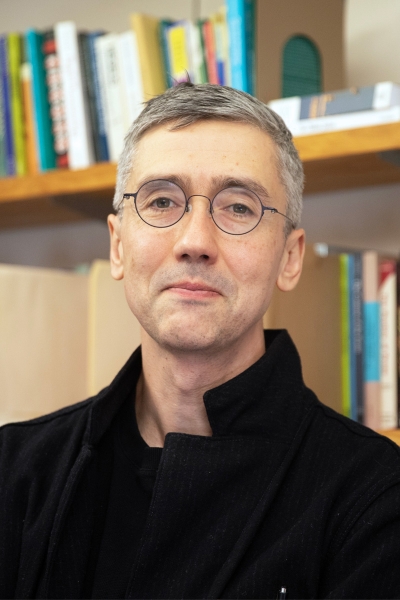
Emma Asher
In this series, we speak with professors who lead different sections of the Core Curriculum to learn what they love about engaging with College students. This month we chat about Contemporary Civilization with Dennis Yi Tenen, associate professor of English and comparative literature. Yi Tenen is the author of Literary Theory for Robots (Norton, 2024); he also co-directs Columbia’s Center for Comparative Media. He has been teaching in the Core Curriculum for a decade.
What is the best part about teaching the Core Curriculum?
For me, it’s the students and the texts; it’s kind of an obvious answer, but being able to read this body of texts — just having the time in your life to systematically read through a single text, and then through a number of related works — I think that’s such a special moment. You know, these special moments are small; they’re not big moments, they’re small, conversational pieces where all of the sudden things click, and you can see people are really excited about the ideas.
And then there’s the fact that there are hundreds of students each semester reading the same works at the same time. You can walk around campus and see hundreds of people reading the same book, which is really great. And that also means that when I teach my other classes, I can rely on our students having this significant shared engagement with philosophic and literary texts, which elevates the conversation across the board.
How do you put your own spin on teaching Contemporary Civilization?
My approach is to stick close to the text. It’s really important for me to step aside and let the text speak and let it unfold in its own particular way for each classroom and each set of students. So each year I read the same text but it ends up being different, because of where the students take the conversation.
One thing I enjoy doing with my classes that’s a bit different is that we go for what I call “philosopher walks,” usually in Morningside or Riverside Park. We break into groups and we’ll walk and discuss the text, then pause and reconvene as a class. In his writings, Plato is constantly walking outside the city. There’s something about combining location and physicality while reading a text; it’s reminding my students that we’re reading this text at Columbia, in Harlem — bringing it back to the city and the community.
Also, it’s very difficult to understand how to finish Contemporary Civilization in terms of an intellectual arc. Once we hit the 20th century, and now the 21st century, there’s so much to read — there’s not one canon that we can really point people to. So the way I’ve tried to solve the “where to finish” problem is to return to Harlem, and to Columbia. I like to come back to the Harlem Renaissance, to W.E.B. Du Bois, Alaine Locke and others. And I like to come back to John Dewey, Zora Neale Hurston, Edward Said, Gayatri Spivak and Saidiya Hartman, who taught or still teach at Columbia. It’s a way that makes the conclusion of the class more real, in a way that encourages students to think about the time and place of where they are in their life in relation to the texts.
What has been your favorite Core Curriculum teaching moment?
A few years back, I held a meeting with one or two other sections of Contemporary Civilization, and what you realize is that each instructor takes the conversation in radically different directions. It was fun for the students because they could see somebody else’s interpretation of the same texts, and how another community interpreted it. There was a lot of productive tension in those meetings, it was a very good conversation. I think engendering more moments like that in the future would be very cool.